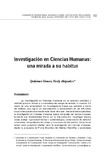Mostrar el registro sencillo del ítem
Investigación en ciencias humanas: una mirada a su habitus
| dc.rights.license | http://creativecommons.org/licenses/by-nc-sa/3.0/ve/ | |
| dc.contributor.author | Quiñónez G., Herly A. | |
| dc.date.accessioned | 2015-03-05T22:10:02Z | |
| dc.date.available | 2015-03-05T22:10:02Z | |
| dc.date.issued | 2013-05 | |
| dc.identifier.issn | 0798-3069 | |
| dc.identifier.uri | http://www.saber.ula.ve/handle/123456789/39916 | |
| dc.description.abstract | La investigación en Ciencias Humanas es un proceso complejo y multidisciplinario, debido a la naturaleza del campo de estudio: lo humano. En medio de esta complejidad, los investigadores trazan sus caminos a través del método para lograr un acercamiento o comprensión de las diferentes situaciones que abordan desde estas áreas del saber. Desde la intersubjetividad,la investigación en Ciencias Humanas busca interpretar los hechos sociales, teniendo sus fundamentos éticos en la interpretación. Investigar implica varias aristas: rigurosidad teórica y epistemológica, comprensión de métodos coherentes, interpretación del campo y comunicación del estudio. Estas líneas tienen como propósito intentar mirar la investigación en Ciencias Humanas, desde la propuesta de Pierre Bourdieu del Habitus Científico y sustentada en una revisión documental, así como un acercamiento a su metodología de investigación, la cual se conjuga entre los métodos cualitativos y no desprecia a los métodos cuantitativos. | es_VE |
| dc.rights | info:eu-repo/semantics/openAccess | |
| dc.subject | Ciencias humanas | es_VE |
| dc.subject | Metodología de la investigación | es_VE |
| dc.subject | Habitus científico | es_VE |
| dc.title | Investigación en ciencias humanas: una mirada a su habitus | es_VE |
| dc.title.alternative | Human sciences research: a look at their habitus | |
| dc.type | info:eu-repo/semantics/article | |
| dc.description.abstract1 | The investigation in Human Sciences is a complex and multidisciplinary process, due to the nature of the field of study: the human thing. In the middle of this complexity, the investigators plan his ways across the method to achieve an approximation or comprehension of the different situations that they approach from these areas of to know. From the intersubjectivity, the investigation in Human Sciences seeks to interpret the social facts, having his ethical foundations in the interpretation. To investigate implies several edges: theoretical rigor and epistemological, comprehension of coherent methods, interpretation of the field and communication of the study. These lines have as intention try to look at the investigation in Human Sciences, from the offer of Pierre Bourdieu, Scientific Habitus and sustained in a documentary review, as well as an approximation to his methodology of investigation, which conjugates between the qualitative methods and does not despise to the quantitative methods. | es_VE |
| dc.description.colacion | 183-202 | es_VE |
| dc.description.email | gomezh@ula.ve | es_VE |
| dc.description.frecuencia | trimestral | |
| dc.publisher.pais | Venezuela | es_VE |
| dc.subject.Mots-cles | Scientist habitus. | es_VE |
| dc.subject.centroinvestigacion | Centro de Investigaciones en Ciencias Humanas (HUMANIC) | |
| dc.subject.facultad | Facultad de Humanidades y Educación | es_VE |
| dc.subject.institucion | Universidad de Los Andes | es_VE |
| dc.subject.keywords | Human sciences | es_VE |
| dc.subject.keywords | Methodology of the investigation | es_VE |
| dc.subject.publicacionelectronica | Revista Fermentum | |
| dc.subject.seccion | Revista Fermentum: Editorial | es_VE |
| dc.subject.thematiccategory | Artes y Humanidades | es_VE |
| dc.subject.tipo | Revistas | es_VE |
| dc.type.media | Texto | es_VE |
Ficheros en el ítem
Este ítem aparece en la(s) siguiente(s) colección(ones)
-
Fermentum - Año 023 - Nº 67
mayo - agosto 2013


